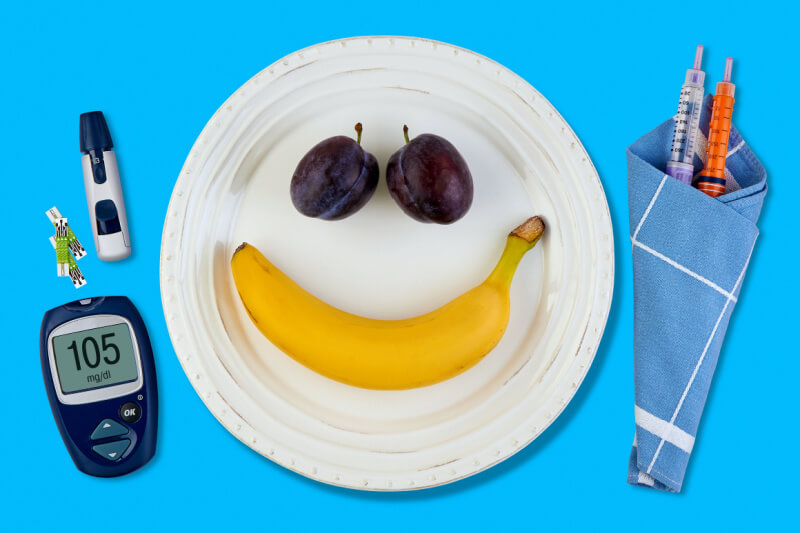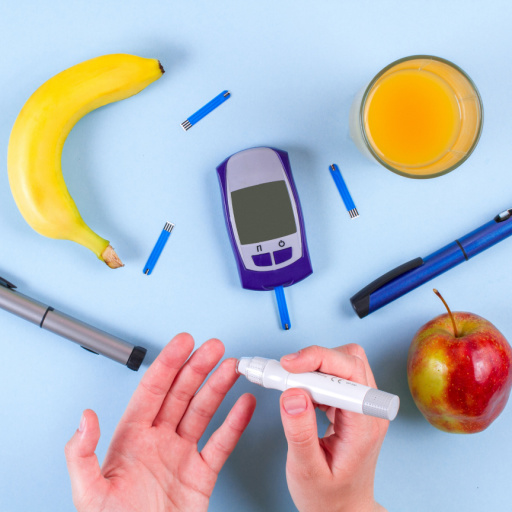Wise blood sugar management can prevent or slow the progression of diabetes-induced medical complications. Therefore, people with diabetes must plan their diet carefully.
When blood sugar levels rise in individuals without diabetes, their bodies produce insulin, which helps move sugar out of the blood and into the cells, where it is used or stored. However, in people diagnosed with this lifestyle condition, the body either does not produce enough insulin or the cells are resistant to the insulin produced.
What you need to know?
- Amount of sugar and carbs in bananas
- Is banana good for diabetes?
- Do bananas raise your blood sugar?
- How many bananas can a diabetic eat in a day?

While fruits and vegetables are healthy and nutritious, they contain natural sugars, which might cause a blood sugar spike in people with diabetes. One such fruit is bananas, which people with diabetes can eat in moderation. Bananas grow on plants with 50–150 bananas in each bunch. They are available in small to large sizes. Therefore, the question stands – Is banana good for diabetes?
Amount of sugar and carbs in bananas
One medium-sized banana, about 126 grams, contains 29 grams of carbs per serving and 112 calories, a vital consideration for individuals with diabetes. The carbs are in the form of starch, sugar, and fiber. There are 15 grams of sugar in bananas, making them a low glycemic medium-sized fruit. A food’s glycemic index (GI) measures how much it affects blood sugar levels. The 3 grams of fiber in bananas is particularly essential for people with diabetes because it can help slow digestion and absorption of carbs. As a result, dietary fiber can help reduce the possibility of a blood sugar spike and improves overall blood sugar management.
Is banana good for diabetes?
The amount of carbs in bananas also depends on their ripeness. Green or unripe bananas contain more resistant starch and less sugar. Resistant starches comprise long chains of glucose (starch) resistant to digestion in the small intestine. Instead, it ferments in the large intestine and feeds good gut bacteria, which can improve your metabolic health and blood sugar management. Therefore, fully ripe bananas have a higher GI and cause blood sugar levels to rise faster.
Do bananas raise your blood sugar?
The portion size of the fruit (called the glycemic load) is equally significant in determining your intake. The bigger the banana, the more carbs you consume, significantly impacting your blood sugar levels.
In contrast to refined sugar products and processed foods, like cakes, candies, or sweetened beverages, bananas are highly nutritious. They are a powerhouse of vitamins, minerals, antioxidants, potassium, vitamin B6 and vitamin C, and dietary fiber, making bananas a healthy food choice.
How many bananas can a diabetic eat in a day?
People with diabetes can eat 1-2 medium-sized bananas a day. You can also follow the given tips to minimize their effect on your blood sugar levels:
- Eat a smaller banana to reduce your sugar intake.
- Try eating less ripened bananas, so the sugar is slightly on the lower side.
- Spread your fruit intake throughout the day to keep your blood sugar levels stable and reduce the glycemic load.
- Pair bananas with a healthy fat or protein source, such as nuts, yogurt, sunflower seeds, or peanut butter, which can slow the process of digestion and absorption of sugar.
You can consult your dietician or doctor, who can chart a healthy eating plan. If you want to measure your blood glucose levels online, look at our online Blood Sugar Calculator.
Stay healthy with the Activ Living Community – your everyday health expert. Stay tuned for more lifestyle and mindfulness-related information.
Popular Searches
Intermittent fasting | Bmi calculator | Bmr calculator | Dry cough home remedies | Period calculator | Home remedies for tooth pain | Home remedies for high bp | Low carb foods | Benefits of ragi | Alkaline foods | How many calories to burn daily | Fruits in winter | How to control sugar | How to lower blood pressure | Protein rich food | Trans fat foods | Allopathy vs Homeopathy | Yoga for pregnant women | Weight lifting exercises | Benefits of laughing | Home remedies for asthma | Neck pain relief exercises| Morning meditation | Yoga nidra benefits | Is kiwi good for diabetes | Types of walking | Symptoms of mucormycosis | How to deal with anxiety





 1800-270-7000
1800-270-7000








